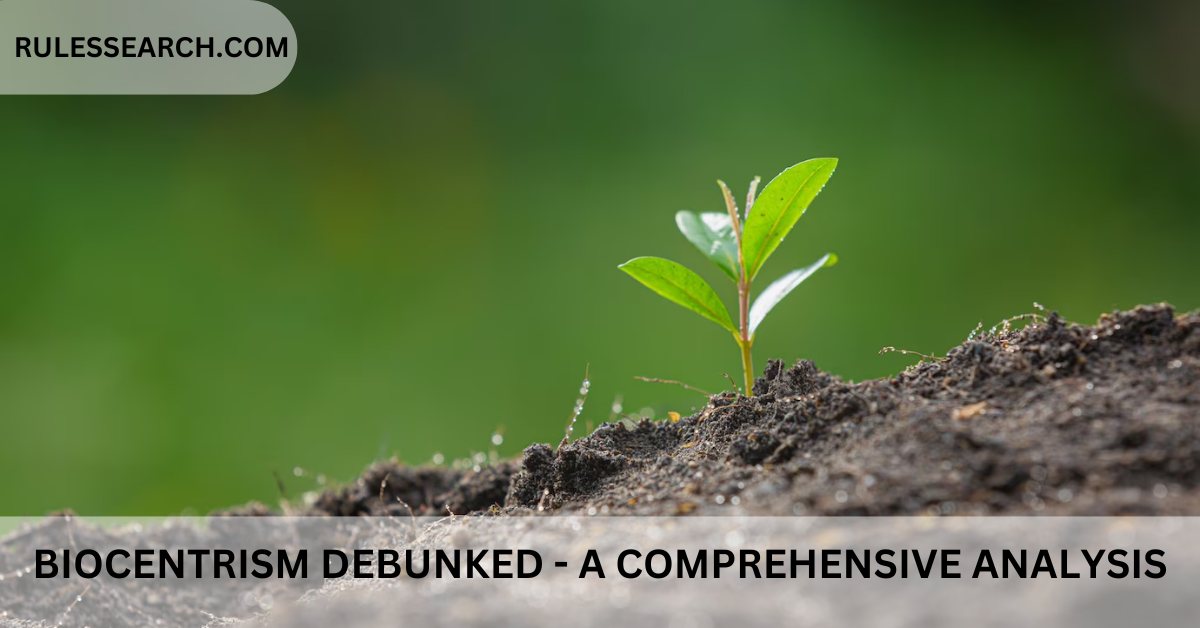Introduction
Biocentrism debunked is a controversial and intriguing theory that places life and consciousness at the center of our understanding of the universe. Proposed by Robert Lanza, this theory challenges conventional scientific and philosophical views by suggesting that life is fundamental to the existence of reality itself. In this detailed analysis, we will delve into the core principles of biocentrism debunked, evaluate its criticisms, and explore alternative theories. This comprehensive guide aims to provide an in-depth examination of biocentrism debunked for readers interested in its implications and challenges.
What is Biocentrism Debunked?
Biocentrism debunked is a philosophical theory introduced by Robert Lanza, a renowned stem cell biologist. It proposes that life and consciousness are central to understanding the universe. Unlike traditional views that see life as a result of the universe’s evolution, biocentrism debunked posits that life itself creates and shapes reality. The theory challenges the notion of an objective reality, suggesting instead that reality is constructed by our consciousness.
Key Aspects of Biocentrism Debunked
- Life Creates Reality: According to biocentrism debunked, the universe exists because of life. Rather than being a byproduct of the universe’s existence, life is viewed as the driver of reality. This implies that without life, the universe would not exist in the way we perceive it.
- Consciousness is Central: Biocentrism debunked argues that consciousness is not merely a product of the universe but actively shapes our experience of reality. Our perceptions, thoughts, and awareness are integral to the structure and nature of reality.
- Subjective Reality: The theory posits that reality is subjective, constructed by our perceptions. Instead of an objective reality existing independently of us, biocentrism debunked suggests that reality is a result of our consciousness interacting with the universe.
The Origins of Biocentrism Debunked
Robert Lanza introduced biocentrism debunked to address perceived limitations in traditional scientific and philosophical views. The theory emerged from his exploration of consciousness and its role in shaping our understanding of the universe. Lanza combined insights from biology with philosophical questions to propose a new framework for understanding reality. His aim was to challenge the conventional view that consciousness is a mere byproduct of physical processes.
Historical Context
Biocentrism debunked was developed as a response to the limitations of materialistic and mechanistic views of the universe. Traditional scientific perspectives often overlook the role of consciousness in shaping reality, focusing instead on physical processes and objective observations. Lanza’s work sought to integrate consciousness into the framework of understanding the universe, proposing that life and consciousness are fundamental to the existence of reality itself.
Core Principles of Biocentrism Debunked
- Life is Central: Biocentrism debunked asserts that life is not a mere accident of the universe but its central feature. This principle challenges the traditional view that life is a consequence of the universe’s physical laws. Instead, biocentrism debunked suggests that the universe’s existence is fundamentally tied to the presence of life.
- Consciousness Shapes Reality: The theory posits that our consciousness is essential in shaping and experiencing reality. Our thoughts, perceptions, and awareness are not passive reflections of an objective reality but active contributors to the construction of reality.
- Reality is Subjective: Biocentrism debunked challenges the notion of an objective reality that exists independently of our perceptions. According to this view, reality is constructed by our consciousness and cannot be fully understood without considering the role of perception and awareness.
Criticisms of Biocentrism Debunked
Despite its intriguing premises, biocentrism debunked faces several significant criticisms:
- Lack of Empirical Evidence: One of the main criticisms of biocentrism debunked is its lack of empirical support. The theory is largely philosophical and does not provide the rigorous scientific backing required for broader acceptance. Critics argue that biocentrism debunked relies on speculative ideas rather than concrete evidence.
- Conceptual Challenges: The idea that consciousness shapes reality raises conceptual issues. If reality is shaped by individual perceptions, it becomes challenging to account for shared experiences and objective facts. Critics question how a subjective reality can accommodate consistent and reproducible scientific observations.
- Conflict with Established Science: Biocentrism debunked often conflicts with well-established scientific theories, particularly in fields like physics and biology. For example, the theory’s view on the central role of consciousness contradicts the physicalist perspective, which holds that physical processes are primary to understanding reality.
Philosophical and Scientific Perspectives
To fully understand biocentrism debunked, it is important to explore how it contrasts with other philosophical and scientific viewpoints:
- Materialism: Materialism posits that matter and physical processes are the primary realities. This view contrasts with biocentrism debunked’s emphasis on life and consciousness. Materialism asserts that the universe’s existence and behavior can be explained through physical laws and processes, without the need for consciousness as a central factor.
- Idealism: Idealism suggests that reality is fundamentally mental or spiritual. While idealism shares some similarities with biocentrism debunked, particularly in its focus on consciousness, it does not place biological life at the core of reality. Instead, idealism emphasizes the primacy of mental or spiritual dimensions.
- Scientific Realism: Scientific realism maintains that reality exists independently of our perceptions. This perspective challenges the biocentrism debunked view by asserting that objective reality can be understood through scientific observations and theories, regardless of individual consciousness.
Debunking Biocentrism Debunked
- Scientific Limitations: Biocentrism debunked’s reliance on consciousness as a central component of reality lacks empirical support. The theory often uses speculative ideas rather than providing concrete evidence. Scientific methodologies typically require empirical validation, which biocentrism debunked lacks.
- Philosophical Issues: The concept of consciousness shaping reality raises philosophical questions about the nature of existence and perception. If reality is shaped by consciousness, it is difficult to reconcile how objective facts and shared experiences fit into this framework.
- Conflicts with Observations: Many scientific observations support the notion of an objective reality independent of individual perception. Theories such as quantum mechanics and relativity provide evidence for a reality that exists regardless of individual consciousness, challenging the biocentrism debunked perspective.
Alternative Theories
Several alternative theories offer different perspectives on consciousness and reality:
- Physicalism: Physicalism asserts that everything can be explained by physical processes and matter. It provides a more scientifically grounded perspective compared to biocentrism debunked. According to physicalism, consciousness is a product of physical processes in the brain, not a fundamental aspect of reality.
- Dualism: Dualism proposes that there are two fundamental kinds of substances—physical and mental. While dualism acknowledges the role of consciousness, it does not place it at the center of reality like biocentrism debunked. Dualism maintains that mental and physical substances interact but are distinct.
- Panpsychism: Panpsychism suggests that consciousness is a fundamental feature of all matter. This theory offers a middle ground between biocentrism debunked and materialism by proposing that consciousness is inherent in all physical entities, not just in living beings.
Implications of Biocentrism Debunked
- Ethical Considerations: The emphasis on life in biocentrism debunked could influence ethical perspectives, particularly regarding environmental and animal rights. By placing life at the center of reality, biocentrism debunked might encourage more profound consideration of the ethical implications of our actions towards other living beings.
- Impact on Science: While biocentrism debunked challenges traditional scientific views, it also encourages the exploration of new ideas about consciousness and reality. It prompts scientists and philosophers to consider alternative perspectives and integrate consciousness into their frameworks.
- Philosophical Impact: Biocentrism debunked contributes to philosophical debates about existence and consciousness. It challenges conventional views and stimulates discussion about the nature of reality and the role of consciousness in shaping our understanding of the universe.
Conclusion
Biocentrism debunked presents a thought-provoking theory that challenges conventional views about reality and consciousness. While it offers an intriguing perspective on the centrality of life and consciousness, it also faces significant criticisms and lacks empirical support. Understanding the strengths and weaknesses of biocentrism debunked helps appreciate its role in philosophical and scientific discussions and highlights the need for rigorous empirical validation.
FAQs
What is biocentrism debunked?
Biocentrism debunked is a philosophical theory suggesting that life and consciousness are central to understanding the universe. It challenges the notion of an objective reality, proposing instead that reality is constructed by our consciousness.
Who proposed the concept of biocentrism debunked?
The concept of biocentrism debunked was proposed by Robert Lanza, a stem cell biologist known for his work on the role of consciousness in shaping reality.
What are the core principles of biocentrism debunked?
The core principles of biocentrism debunked include the idea that life creates reality, consciousness is central to understanding the universe, and reality is subjective and shaped by individual perceptions.
What are the main criticisms of biocentrism debunked?
Main criticisms include a lack of empirical evidence, conceptual challenges related to subjective reality, and conflicts with established scientific theories.
How does biocentrism debunked differ from materialism?
Biocentrism debunked contrasts with materialism by placing consciousness and life at the center of reality, whereas materialism asserts that physical processes and matter are primary.
What is the role of consciousness in biocentrism debunked?
In biocentrism debunked, consciousness is viewed as a fundamental element in shaping and experiencing reality, rather than being a byproduct of physical processes.
Are there alternative theories to biocentrism debunked?
Yes, alternative theories include physicalism, dualism, and panpsychism, each offering different perspectives on consciousness and reality.
What implications does biocentrism debunked have for ethics?
Biocentrism debunked could influence ethical considerations by emphasizing the centrality of life and encouraging more profound consideration of our actions towards other living beings.
How does biocentrism debunked impact scientific discussions?
Biocentrism debunked challenges traditional scientific views and stimulates discussions about the role of consciousness in understanding reality, prompting exploration of new ideas.
What are the philosophical impacts of biocentrism debunked?
Biocentrism debunked contributes to philosophical debates about existence and consciousness, challenging conventional views and stimulating discussions about the nature of reality.



